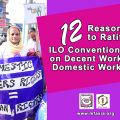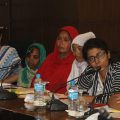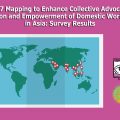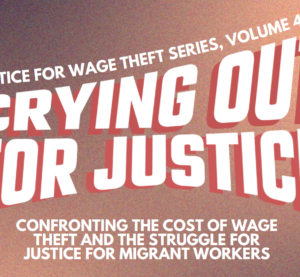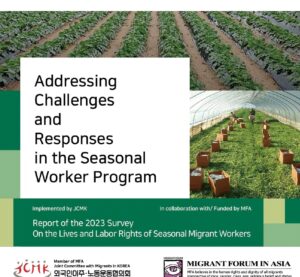International Campaign For The Recognition Of Domestic Work As Work
— June 3, 2010The fair and equal treatment of domestic workers has been among the major concerns of Migrant Forum in Asia (MFA) in its advocacy for the protection and promotion of the rights of migrant workers and their families in Asia especially women migrant domestic workers.
The ILO estimates that there are around 100 million domestic workers around the globe. Domestic workers provide an environment for other workers and their families to improve their living standards by taking care of their homes and household members (children and the elderly). Due to the nature of their work and their working environment (households of private persons), they are not monitored by labor inspectors and they are not, in most countries, included under national labor laws, thus denying their status as “real workers”.
As a result, they have been suffering from persistent abuses, violence and violations of their rights, including fundamental principles and rights at work as well as the differences in employment arrangements, methods of remuneration, working time and other aspects of their working conditions.
The campaign for recognition of and respect for migrants’ rights has been a long and arduous struggle aggravated by rapid changes in our globalized world that challenge every small step towards progress, even after the Migrant Workers’ Convention came into force in 1990. Several countries are introducing policy reforms affecting migrant domestic workers yet these fall far short of the reforms needed to combat widespread abuse, much less remove the systematic vulnerabilities and discrimination/ marginalization of migrant domestic workers.
The creation of the ILO Multi-Lateral Framework on Migration in 2004 is one such step. But even as the benefits of global labor migration, especially vis-à-vis national development of sending countries, have caught on the discourse, a significant sector remains highly vulnerable: domestic workers, especially women migrant domestic workers.
The ILO’s decision to include the discussion on decent work for domestic workers in the 2010 International Labour Conference (ILC) is a significant and crucial development. In preparation for this, ILO issued a Law and Practice Report along with a questionnaire in April 2009 for governments, labor unions and employers (tripartite approach) to answer. The process hopes to culminate in a Domestic Workers Convention, which would recognize the dignity of domestic work and provide better protection for domestic workers, including migrant domestic workers.
Upon the release of the questionnaire, consultations at national, regional and international levels were conducted for the purpose of generating a response on a possible ILO instrument that addresses the specific conditions of domestic workers and strengthen protections of this vulnerable informal sector. These processes were initiated both by CSOs and ILO social partners ( tripartite constituents).
Our Campaign
MFA’s commitment to the issue of domestic work dates back to the network’s establishment in 1994, in a forum held in Taiwan, Province of China entitled, “Living and Working Together with Migrants in Asia”. Since then, the issue of domestic work has been a core concern of its programs.
The International Campaign for the Recognition of Domestic Work as Work is the network’s response to the growing abuses and violations committed against migrant domestic workers. In general, the campaign seeks to advocate for concrete policies and practices in Asia and internationally that would recognize, institutionalize and advance the rights and status of MDWs as workers. Specifically, it seeks to:
- Advocate for the recognition of rights and status of DWs in Asia and across regions
- Intervene in ILO DW Convention process
- Lobby for the establishment of local/national laws recognizing the rights and status of DWs
- Promote of policies that ensure the respect of DWs’ rights as people, as women (95% of DWs are women), and as workers
- Campaign for the removal of discriminatory policies against migrant domestic workers
- Creating public awareness in recognizing, respecting, and promoting the rights and status of DWs
MFA was the first network in the region to call for the recognition of migrant workers’ right to freedom of association and the right to organize and form associations or trade unions. MFA members in Hong Kong, Special Administrative Region of China helped spearhead the organizing of Filipino and Indonesian migrant domestic workers’ unions. Currently, a number of members of the MFA network are associations and unions of migrant domestic workers, including the Indonesian Migrant Workers Union (IMWU) – Hong Kong, Special Administrative Region of China, Filipino Domestic Workers’ Union (FDHGU) – Hong Kong, Special Administrative Region of China, Coalition for Migrants’ Rights (CMR) – Hong Kong, Special Administrative Region of China, Solidaritas Migran Scalabrini – Indonesia, and the Serikat Buruh Migran Indonesia (SBMI) to name a few.
On 18 December 2006, in celebration of the International Migrants’ Day, MFA launched the “Equal Pay for Equal Work Campaign” as response to the growing discrimination in terms of wages of migrant domestic workers coming from different nationalities. The campaign aims to promote equal, fair and human treatment, just living and working conditions, access to opportunity for advancement and well-being and equal pay for equal work among local and migrant domestic workers.
In June 2007, MFA played an instrumental role in the creation of the Asian Migrant Domestic Workers’ Alliance (ADWA) as a resolution of the 1st Asian Domestic Workers Assembly held in Manila. ADWA is a self-representative regional alliance of migrant domestic workers. The alliance is led by the grassroots MDW organizations while the NGOs/civil society partners provide support and facilitation to enable MDWs in Asia to self-represent and advocate for their common interests and objectives. The Asian Migrant Centre (AMC) and Migrant Forum in Asia (MFA) are the Asian regional advisers of ADWA.
In May 2008, MFA together with ADWA, Coalition for Migrants Rights (CMR), Serikat Buruh Migrant Indonesia (SBMI), Humanitarian Organization on Migration Economics (HOME) Asian Migrant Centre (AMC) and International Labor Office- Jakarta (ILO) launched the “Regional Campaign for the Recognition & Protection of Migrant Domestic Workers” coinciding with the International Labor Day to emphasize the workers’ agenda of the DW campaign.
In October 2008, the 3rd International Workshop of DWs was convened in Manila in time for the 2nd GFMD. It was convened by ADWA, RESPECT MDW Campaign Network in Europe, and MFA. Co-organizing the event was AMC, HRW, Asian Domestic Workers Network (ADWN), International Union of Food, Agriculture, Hotel, Restaurant, Catering, Tobacco & Allied Workers Associations (IUF), and supported by MRI. More than 85 representatives from 15 countries in Asia, Europe, North America, Latin America, Middle East and Africa joined. The workshop was a follow-up to similar DW meetings held in 2006 (New York) and 2007 (Brussels) as part of the civil society workshops during the GFMD. The International Working Group for Domestic Workers (IWG-DW) was established to coordinate and spearhead the international DW campaign. MFA, ADWA and RESPECT were appointed as the IWG Steering Committee.
Given the significant developments at the ILO, the campaign for the Adoption of an ILO Convention in 2011 will be its primary focus as a crucial part of the network’s umbrella campaign for the Recognition of Domestic Work as Work.
MFA believes that the special conditions of domestic workers require legislative frameworks that address their needs if their rights are to be protected. The framework must be drafted with focus on dignity of work and rights to life and safety, which are necessary to improve the conditions of domestic workers. An international instrument on the rights of domestic workers will go a long way in setting standards that can be translated into national legal frameworks.
In relation to this campaign and to prepare for the upcoming International Labour Conference in 2010 and 2011, MFA together with ADWA spearheaded the consultations at the national and regional levels to generate responses to a possible ILO instrument that will address the specific conditions of domestic workers and strengthens protections of this vulnerable informal sector. These consultations were done in collaboration with our partner trade unions and civil society organizations.
The first national consultation on the rights of women migrants and domestic workers took place in Tarlac City, Philippines from May 13-16, 2009. The consultation was the first of its kind to be held in Asia. It brought together advocates of the rights of local domestic workers, migrant domestic workers and women migrants. The organizers were conscious of integrating the advocacies of migrant domestic workers with those of the local domestic workers for purposes of coming up with a convention for domestic workers.
Following the Philippines were Indonesia, Cambodia and Singapore held on June 18-19 June, 7-8 July and 28 July respectively. Apart from the face-to-face consultations, MFA also conducted online consultations among its members and partners. Recognizing the need for a consolidated and coordinated action in the region, MFA together with ADWA, the National Domestic Workers Movement (NDWM) and the Center for Education and Communication held a Regional Consultation on Domestic Work from 3-4 September 2009 in Mumbai, India.
These processes validated the ILO report that while there are existing legislations/mechanisms that protect DWs, these are not enough to address specific conditions of DWs, and justifies the need for a Convention.
Domestic workers face problems under the four pillars of decent work, which include: rights to work, employment, social protection and social dialogue. It was agreed that discourses on domestic work and migrant domestic work are same. The need to promote the alliance of domestic workers and migrant domestic workers was also emphasized.
The regional consultation came up with three slogans on domestic work which the network and its partners will carry in their respective campaigns at the local level. These are the following:
- Domestic Work is Work!
- Domestic Workers are Workers!
- Domestic Work is Not Slavery!
Domestic Work in Asian Context
The issue of domestic workers in Asia is hardly new. The Asian Migrant Centre, a regional research advocacy group, estimates that there are around four million MDWs in Asia, over 95 percent of which are women. These women mostly come from Sri Lanka, Bangladesh, India, Indonesia, the Philippines, Thailand, Nepal, Lao PDR and work in Malaysia, Singapore, Thailand, Hong Kong, Special Administrative Region of China, Macau, India, Taiwan, Province of China and the Middle East.
The general situation of domestic workers in Asian countries is that most of them live and work like slaves. In West Asian countries, domestic workers work 24-hour a day, seven days a week. Instances of under payment are in large number.
Most receiving countries do not have legislative means to protect domestic workers and many do not consider domestic work as work. As a result, domestic workers are subjected to discrimination and abuses that other workers may not face. Domestic workers often face the following issues: lack of national legislations that specifically address the situations of domestic workers; vulnerability to abuse and discriminatory policies against domestic workers; the lack of recognition of domestic work as work and extending the rights of workers to domestic workers, the derogatory labels attached to them, recruitment related abuses, deplorable working conditions, trafficking of women and children domestic workers and lack of legal mechanism to seek redress.
In Hong Kong, Special Administrative Region of China and Jordan, policies on domestic workers are recognized. The Hong Kong, Special Administrative Region of China employment ordinance recognizes, to a certain degree, domestic workers – there is a standard contract and recognition of rights to unionize, assemble, and seek redress of grievance. However, recognition is restricted. Workers cannot do collective bargaining. There is no institutional way of consultation between governments and domestic workers’ group and unions.
In terms of monitoring, Hong Kong, Special Administrative Region of China’s Immigration Department oversees domestic workers, not the Labour and Welfare Department. On health policies, domestic workers are accorded health insurance. In Taiwan, Province of China and Thailand, mandatory testing is required. In some countries pregnancy is considered a “disease” for migrant domestic workers.
Malaysia recognizes domestic workers as “domestic servants” that makes them more prone to abuse and exploitation.
When it comes to employment contract, only Hong Kong, Special Administrative Region of China has a legal standard contract for all nationalities, while Lebanon has just introduced the employment contract. In the last two years, Singapore adopted a standard contract developed by employers, which the government has deemed “good enough”. Bahrain has no standard contract and does not recognize the Philippine standard contract presented by Filipino migrant domestic workers.
Domestic workers have no job security as termination of contract is allowed by both parties. In Malaysia, whatever “just cause” means, domestic workers do not receive separation of payments.
In terms of the scope of work, the Hong Kong, Special Administrative Region of China contract specifies five main tasks for domestic workers. Working hours are 24 hours across the board. In Lebanon, contract prescribes maximum 10 hours of work and minimum eight hours of sleep. Most labour laws do not require one day off per week.

